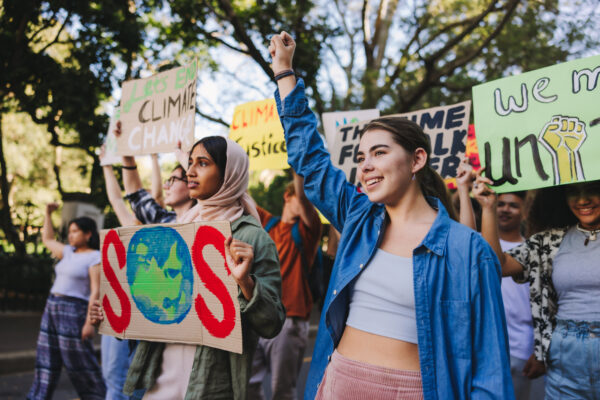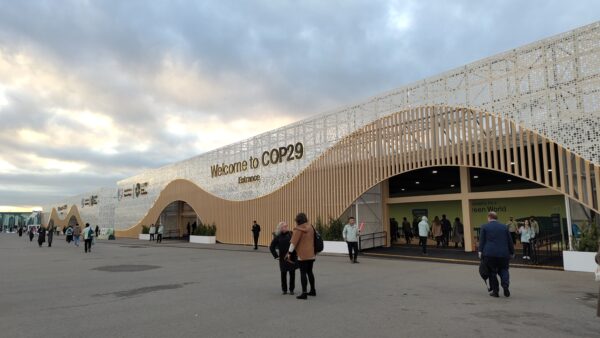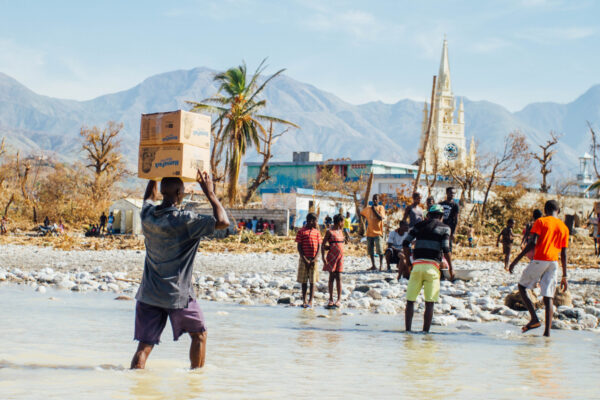Climate change loss & damage — an urgent, cross-cutting issue
Amanda Colombo, Frances Fuller, Laetitia De Marez
Share

From unprecedented super charged tropical storms to record-breaking temperatures and ever more grim predictions of sea level rise, scientific evidence of current climatic events points to a new norm. These climatic events are rapidly pushing Small Island Developing States (SIDS) to the verge of their coping capacities, beyond which they will experience irreparable loss and damage. These risks threaten the socio-economic stability and undermine already limited abilities to achieve the Sustainable Development Goals. How can we increase understanding and international cooperation to address this urgent issue?
A recent event held at the Office of the Commonwealth at the United Nations in New York and hosted by the Government of Belize, provided an overview of what the concept of climate change loss and damage is about, how it is being addressed in the multilateral context, and the potential methods of support and financing. The event took place at an opportune time, in the middle of the first week of the 2018 High-Level Political Forum on sustainable development, under the theme of “Transformation towards sustainable and resilient societies”.
Transforming our societies to become sustainable and resilient is about “securing the future of our people,” as called for by Caribbean leaders at a July meeting. The significance of loss and damage extends beyond the international climate negotiations under the UNFCCC and the work of its scientific arm, the IPCC. It is a significant issue in the context of disaster risk management under the Sendai Framework, the 2030 Agenda for Sustainable Development, Financing for Development and to other global discussions such as security or migration, said H.E. Ambassador Lois M. Young in her opening remarks.
Despite mitigation and adaptation efforts, SIDS are already experiencing loss and damage such as loss of territory, damages to critical infrastructure, loss of income and livelihoods, decreased worker productivity and forced displacement and migration of communities, demonstrated Climate Analytics’ Bahamas-based scientist Dr. Adelle Thomas. She noted that highly vulnerable SIDS should pursue comprehensive climate risk management actions including regional risk pooling, livelihood protection policies, insurance platforms, hazard mapping, early warning systems and robust contingency funds.
The UNFCCC negotiations still need to address financing for incurred loss and damage; the inclusion of loss and damage in related negotiation themes; and provision of an adequate budget to implement the work plan of the body created to deal specifically with the issue, the Warsaw International Mechanism on Loss and Damage Executive Committee (WIM ExCom), said Dr. Thomas.
For more information about Loss and Damage, visit our resource page
By the end of the century, up to 32 million people in the coastal communities in the Caribbean may be affected by rising seas, and face increasing risks of climate- and weather-related extreme events. In her presentation, Climate Finance Advisors’ Stacy Swann stressed the importance of climate-smart investments and diverse financial approaches to address loss and damage, including blended finance for resilience, insurance approaches, and mainstreaming climate risk into infrastructure lending.
In 2017, eight countries in the Caribbean received payouts of more than $50 million to cope with short-term impacts after Hurricane Maria, as part of a regional insurance approach with the Caribbean Catastrophe Risk Insurance Facility (CCRIF). While this is critical to assist impacted countries in immediate recovery efforts, insurance only cover a fraction of the damage that exceeded 100% of the GDP of an island in certain cases. Insurance schemes by definition do not reduce risk. They can be part of a risk management strategy, but are not a “silver bullet”, concluded Ms Swan.
The discussion, moderated by H. E. Ambassador Janine Coye-Felson, revolved around climate-proofing and building resilience into other issues, such as gender and sustainable development. Several participants highlighted the importance of incorporating climate risk into both mitigation and adaptation projects to protect against increased future variability caused by climate change.
One of the key questions under discussion was the difficulty of putting a price on non-monetary losses, such as loss of culture, lives, livelihoods and communities. Dr. Thomas stressed that it is crucial for SIDS to develop and implement policies and strategies addressing migration and evacuation during storms, as many SIDS do not currently have policies in place and the risk is increasing.
Approaching how we can work multilaterally to address the impacts of climate change, including loss and damage with an open mind – not in traditional “silos” – is key to making a difference on the ground. Raising this issue in the context of UN discussions at the intersection of climate change and sustainable development “will not dilute it, but will strengthen it” said Seychelles Ambassador Ronald Jean Jumeau.
Kudos to @BelizeMissionUN's #Ambassador Lois Young for leading these amazing women at a discussion at #HLPF18 today on financing to tackle #climatechange #lossanddamage. L to r Belize's @jfelson, Amb Young, @adelle_SIDS of @CA_Latest and @StacySwann of https://t.co/xX4cGAvMd5 pic.twitter.com/VWfDVXHmDC
— Ronny Jumeau (@ronny_jumeau) July 12, 2018
There is much to gain from connecting the dots between addressing loss and damage, promoting sustainable development under the 2030 Agenda for Sustainable Development and reducing risks under the Sendai Framework. The tools and instruments that have been developed for coping with the risks of natural disasters are relevant for address loss and damage, and development increases resilience.
At the same time, however, it is clear that vulnerable countries will not be able to shoulder the issue of loss and damage themselves. Recurrent climate impacts undermine the very economic capacities that are needed to cope with disasters (for example by slowing economic growth or contributing to negative assessment of creditworthiness). While it is thus clear that technically all the expertise and skills for coping with disasters are needed, it is also clear that multilateral support will need to buffer the impacts of climate change.












